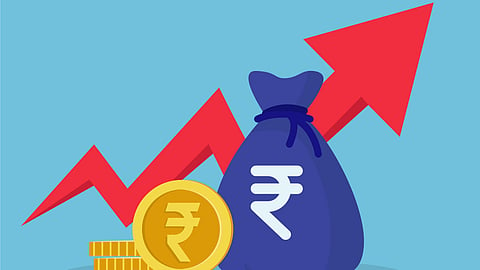

CMA Hrishikesh R Nampoothiri
India, the seventh-largest country by area and the most populous as of June 2023, has emerged as a remarkable economic force since gaining independence from centuries-old colonial rule. With a robust democracy, 28 states, 8 union territories, and a position as the world's fifth-largest economy based on nominal GDP and third-largest based on GDP Purchasing Power Parity, India is currently at a pivotal moment in its history. Amidst global economic uncertainties, India stands out as a beacon of resilience and stability.
Economic Milestones: The astonishing transformation of India, from a poverty-stricken nation in the 1940s to a thriving economy, is nothing short of remarkable. As of August 2023, India's GDP stands at 7.8%, slightly below the RBI's expectations but still strong in comparison to other major global economies. Moody's, a leading rating agency, has raised India's GDP forecast to 6.7% from 5.5%, citing robust economic momentum and rapid infrastructural reforms.
The Influence of Freebies: However, India faces a unique challenge as it prepares for a series of elections in 2023 and 2024. Major states, including Chhattisgarh, Madhya Pradesh, Rajasthan, and Telangana, are set to hold elections in the coming year, followed by Andhra Pradesh, Arunachal Pradesh, Sikkim, and Odisha, with the general election in 2024. In a bid to secure votes and power, political parties across the spectrum are offering promises of freebies, creating a phenomenon that has raised serious concerns for both Indian citizens and the economy.
Understanding Freebies: Freebies, defined as gifts or services offered by politicians to secure votes and electoral victory, pose a significant threat to the nation's aspirations and economic development. It is essential to differentiate freebies from welfare schemes. While welfare schemes, such as subsidized food grains, education, and healthcare, aim to uplift marginalized sections of society, freebies, such as free transportation, electricity, or gas connections, often burden taxpayers and hinder overall economic growth.
The Impact on Inflation: Although freebies may not have a direct link to inflation, their consequences can indirectly affect the economy. Inflation, the rise in prices over time, is often driven by a decline in the purchasing power of money. When freebies lead to increased disposable income, consumer demands rise, resulting in price hikes. This scenario can disrupt the equilibrium of supply and demand, leading to inflation.
Dependency and Economic Consequences: The culture of freebies creates a sense of entitlement among citizens, leading to dependency on the government. This culture undermines individual accountability and impedes a nation's growth and development.
Balancing Welfare and Economic Growth: Welfare schemes that target the poor and marginalized aim to integrate them into the economic mainstream. However, indiscriminate freebies, such as free electricity or transportation, not only strain state finances but also contribute to inflation and economic instability.
Profitable vs. Non-Profitable Benefits: Benefits provided to corporations and individuals differ in their economic impact. Profitable benefits can stimulate economic growth, while non-profitable benefits lead to financial, economic, and social instability. Promises of freebies to individual citizens only yield temporary benefits and hinder long-term economic development.
A Lesson from Margaret Thatcher: Former UK Prime Minister Margaret Thatcher's words remind us that public money is ultimately taxpayers' money. Excessive freebies strain state finances, leading to higher taxes and debt burdens, which ultimately hinder the nation's economic progress.
Conclusion: India's economic journey is marked by remarkable achievements, but the proliferation of freebies in electoral politics threatens its economic stability. A clear line must be drawn between welfare schemes that genuinely benefit citizens and freebies that are primarily aimed at securing votes. Sustainable economic growth should remain the nation's top priority, ensuring a prosperous and resilient future for all Indians.
